
Young women in STEM win HeForShe scholarships
Waterloo students entering STEM disciplines in science, technology, engineering and mathematics receive $12,000 awards

Waterloo students entering STEM disciplines in science, technology, engineering and mathematics receive $12,000 awards
By Staff University of Waterloo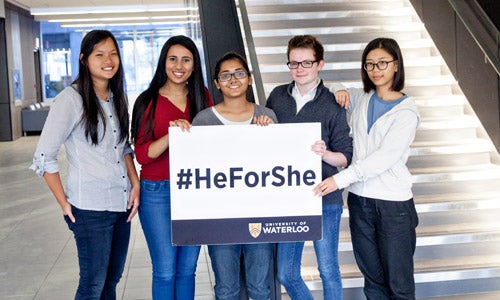
Young women with a passion for computer science, physics and engineering have received $12,000 scholarships under the University of Waterloo’s HeForShe IMPACT scholarship program.
Launched last year, the scholarship program will support a total of 24 women over a four-year period as part of Waterloo’s ongoing efforts to achieve gender equity in STEM - science, technology, engineering and mathematics - programs. The University of Waterloo is one of ten universities around the world to join the United Nations HeForShe IMPACT 10x10x10 campaign, a global commitment launched to promote gender equity.
This year’s recipients come from as far away as India and China and all are excited about diving into their chosen professions through their co-op education work terms.
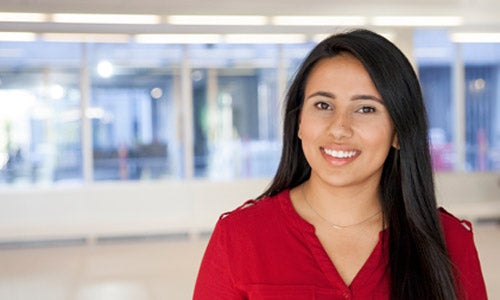
Joshi is quick to credit supportive parents for encouraging her interest in STEM subjects, but admits it took a little courage to look beyond their expectations of a career in medicine and the “intimidating” majority of men in engineering.
A graduate of Centennial Collegiate Vocational Institute in her hometown of Guelph, Joshi cites the University’s own Pearl Sullivan - a mechanical engineer and dean of the engineering faculty - as a role model who has proven that “women are equally as capable as men.”
She is encouraged by the rising proportion of women entering engineering programs at Waterloo, now at almost 30 per cent, and hopes she is setting her own example for younger girls to follow on the way to closing the gender gap entirely.
“Don’t let a number tell you what you’re going to do in life,” Joshi says of the continuing disparity. “Just do what you want.”
Drawn to Waterloo by its co-op model, as well as the reputation of engineering students as “well-rounded global citizens,” she is aiming to strike a balance in all areas of life.
“That’ll give you the most success – and happiness, of course,” Joshi says.
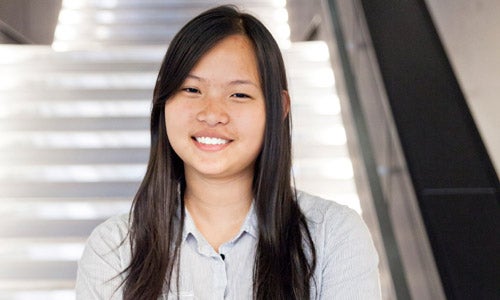
A self-described introvert, Kwan had to push herself in high school to volunteer for a job on the information desk at a hospital near her hometown of Scarborough.
But she got so much out of interacting with strangers that she extended her initial commitment from one year to two and now hopes to step outside her “comfort zone” even more while studying software engineering at Waterloo.
Kwan’s affinity for numbers goes all the way back to after-school care as a four-year-old, when she was often given a choice between exercises in math or English and never took long to decide.
She was later encouraged to pursue STEM subjects by teachers at Monsignor Charbonnel Catholic Secondary School in North York, including one who insisted he could see her as an engineer even when she doubted it.
“I had that stereotype in my mind of a guy with a yellow hat trying to design a bridge,” Kwan says.
A fan of Richard Feynman, the late, Nobel Prize-winning theoretical physicist, she is considering a career as a game developer, but also looks forward to having her eyes opened to other possibilities during her work terms in the engineering co-op program.
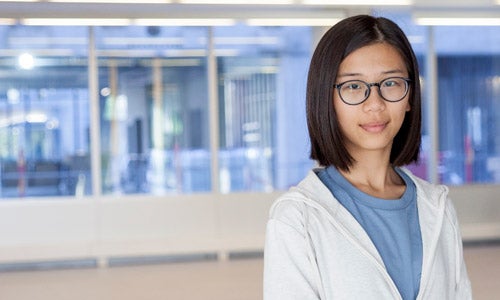
Yue Ding, who grew up in Nanjing, China, has always loved math and science. When her parents noticed her passion, they advised her to ignore those who say girls shouldn’t pursue STEM.
“They told me to do what I’m good at and interested in, and not let other people decide how I live my life,” said Ding. “My teachers supported me too. They helped me patiently when I was having trouble and they always told students that being good at STEM had nothing to do with gender.”
Ding chose to come to the University of Waterloo because of co-op education and the strong computer science program. “Don’t worry if you want to study computer science but don’t have a previous coding experience,” she said. “The courses are beginner-friendly and the professors here are nice and patient.”
Ding is adjusting to life in Waterloo, and credits her time as the founder of a Rubik’s Cube Society, as giving her the courage and life skills to embrace such a big change. “I organized activities, raised funds for the society and taught students how to solve a cube. I also organized lectures to help advanced players improve their skills,” said Ding. “I gained a lot of experience and made many new friends.”
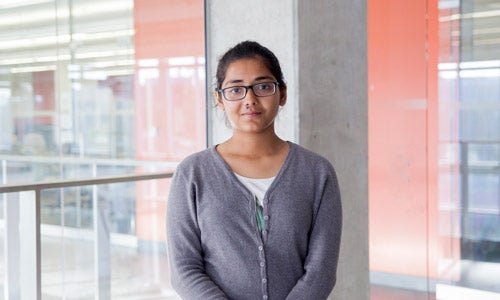
Ankita Mishra was drawn to Waterloo for three reasons - its highly ranked computer science program, co-operative education and the vibrant startup community.
“The idea of creating the most complex programs that run the world today, with the simplest ideas as building blocks, has always been an immense source of inspiration for me,” said Mishra.
Mishra, who came to Waterloo from Lucknow, India, said her curiosity extends beyond math and computer science to astronomy, theoretical physics and history. “Each of these disciplines tackles questions which help us understand the universe and human life more deeply,” she said.
Mishra has been fortunate to be supported and encouraged by parents who never questioned her dreams of studying in a STEM field. “I was lucky enough not to be a victim of others’ perception of me because of my gender. But I have witnessed sexism and it’s one of the most unpleasant things to happen to a woman.”
Mishra advises girls to persevere despite the obstacles they experience. “If you are a victim of even a mildly sexist environment, I understand that you will have more difficulties due to the years of negative reinforcement you have received while contemplating a career in STEM.
“But be strong and pursue the career you want to pursue because you deserve that.”
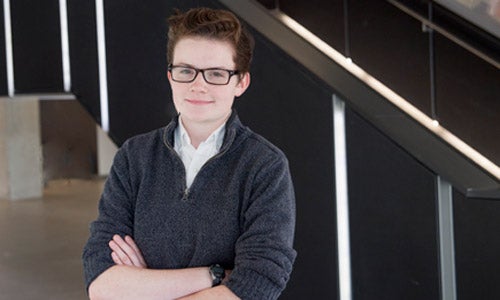
Stephanie Swanson, whose role model is the late Nobel-prize winning physicist Marie Curie, dreams of becoming a teacher one day so she can share her love of science and math with others.
Swanson had a teacher who pushed her to excel, and in her final year of high school coached her through a national neuroscience competition in which Swanson placed second. “My teacher was behind me the whole way with support, advice and endless enthusiasm.”
More importantly, the teacher was one of the people who helped Swanson, who is studying physics at Waterloo, overcome her shyness.
“When I was younger I was very shy, to the point of debilitation. Over the course of the last couple of years, I have really pushed myself to exude confidence and take on leadership roles in my community,” said Swanson. “It has been unbelievably rewarding and life changing.”
Swanson ran the Gay Straight Alliance at her high school and founded a science club that featured expert guest speakers in all science disciplines.
Swanson was drawn to Waterloo because of its co-operative education program. “It’s such a great opportunity to get some genuine and varied experience in the workplace,” she said.
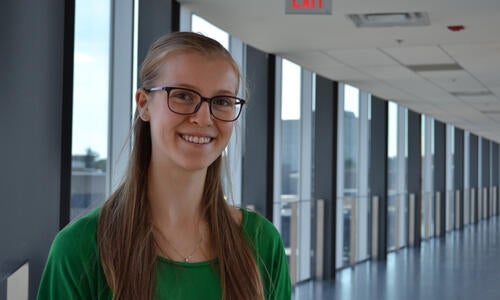
Emily Carlson dreamed of becoming a professional ballerina but ultimately her curiosity about the world and her fascination with the work of the late physicist Richard Feynman - led her to pursue an academic career.
“Learning occurs in both academia and the arts. But academia is where I can discover new things,” said Carlson. “It was an accumulation of all of my experiences that lead me to want to study mathematical physics.”
Carlson, who studied ballet in her hometown of Vancouver, credits her parents and ballet master Li Yamming for supporting her dream of becoming a professor.
“Professors are a very diverse set of people and I enjoy working with people from different backgrounds,” said Carlson. “Everyone brings their own experiences and thoughts to contribute to the community of knowledge.”
Carlson points out that her ballet studies gave her confidence and taught her discipline, devotion and dedication - the very life skills that will carry her through her mathematical physics studies. She chose the University of Waterloo after a campus visit where she learned about the physics and mathematics professors and appreciated the close knit community feel.
She tells young women to do what they love. “Everyone has a beautiful gift if they look inside themselves and listen to their desires,” said Carlson.

Read more
Here are the people and events behind some of this year’s most compelling Waterloo stories

Read more
Meet five exceptional Waterloo graduate students crossing the convocation stage as Class of 2025 valedictorians

Read more
Meet the 14 exceptional students representing Waterloo’s newest grads
The University of Waterloo acknowledges that much of our work takes place on the traditional territory of the Neutral, Anishinaabeg, and Haudenosaunee peoples. Our main campus is situated on the Haldimand Tract, the land granted to the Six Nations that includes six miles on each side of the Grand River. Our active work toward reconciliation takes place across our campuses through research, learning, teaching, and community building, and is co-ordinated within the Office of Indigenous Relations.